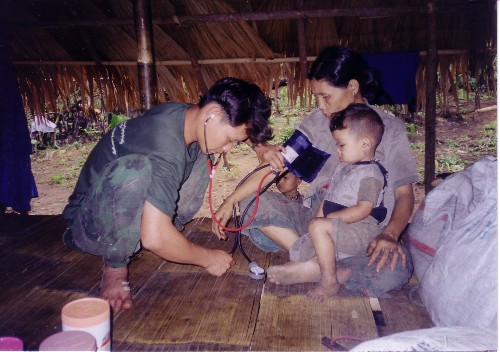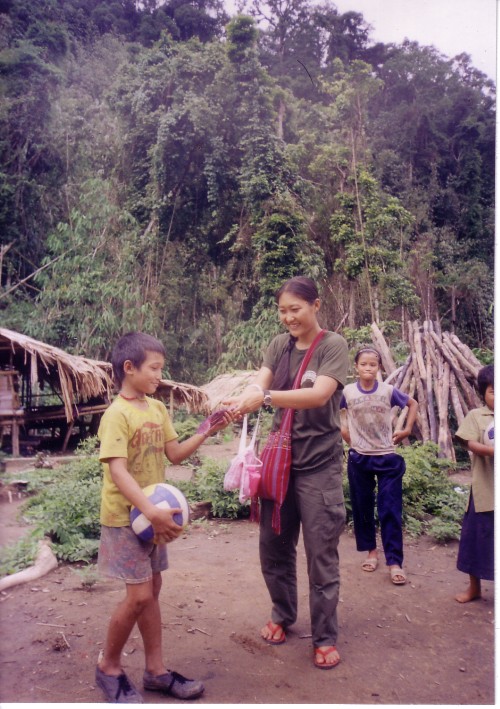|
 |
 |
Introduction:
In April 2004, FBR relief mission team and CIDKP south office staff held a meeting to arrange the mission for the purpose of distribution of assistance funds, health care service, encouraging the IDPs (Internally Displaced People) spiritually and learning about the situation of IDPs in hiding. They decided that the relief mission would visit the hiding places of displaced people in Ler Mu Lah Township’s Ma Lait area. On May 8th, 2004 the team left from the southern relief office, for relief mission trip and arrived back on June 21st, 2004.
The assistance fund were used to provide a school to the neediest IDPs, and for mission and reporting needs. Material and medicines which we received from Free Burma Rangers were used for IDPs. For security a section of Karen Army troops and some villagers took responsibility and went along for the mission. The relief team visited eight IDP hide sites and provided medical care to 185 patients. IDP population in the area the team visited was 365 people.
Internally Displaced People; Situation in Ma Lait Area
The majority of IDPs in this area are villagers from Tenasserim river villages, Ler Mu Lah Township, Mergui-Tavoy district. Before being attacked by the Burma Army,and fleeing to these hide sites, they did not have to worry too much about how to earn a living because they owned orchards in their villages. After they moved to these hide sites, they had to abandon all their orchards, property and hide up stream. There is no security for them and they face many other problems, mainly a shortage of food for their families and lack of security for their hide sites.
Livelihood
IDPs in this area are earning their living by slash and burn rice farming. Every family is trying hard to produce enough food to survive. Rats, insects, wild animals and abnormal weather have lowered the rice production, so this year they were not able to grow enough rice to feed their families. This year some IDPs had enough from last year’s stores, but they have shared with less fortunate families and there is not enough for the whole year. Some IDPs can earn a small income from hunting, collecting honey and saddle wood to sell to Thailand. With this small income, they buy rice, salt, fish paste and other necessary items for their families. However this income is a small amount and not enough to feed and clothe their families.
Health
There is a Mobile Health Clinic with one medic and three staff that operates in this area. This area is far from the Thai-Burma border and the car road, making transportation of medicine difficult. Moreover, because the IDPs live in several small hide sites, along nearly every small stream, it is difficult for medical teams to find them all and treat them when they are sick. Medics cannot regularly visit every hide site. According to the IDPs, they rely on traditional and herbal medicine when the medic is not available. Their common ailments include: malaria, abdominal pain and joint pain.
Education
This academic year, there are two primary schools in IDPs sites. One in Tu Loo Per Ko, with 10 students and one in Taw Kwai Soe with 20 students. When the relief team visited them, the registration of the students was not finished and the schools had not started yet. The teacher in Taw Kwai Soe hiding site is Saw X X. Last year there was a primary school in Mae Lait site, but this year, in order to find a good place to farm rice, the IDPs moved to Htee Peo Lay Khi and set up school in Tu Lu Per Koh. The teacher in Tu Lu Per Kp is Naw XX and she graduated from Bible School. Depending on security and the distance of the school from their hide site, some parents do not send their children to school. Some would like to send them, but it is difficult to transport food for their children to the school site. Some children must stay at home to look after younger brothers and sisters. As a result of these factors, many school aged children do not attend school.
Security
There are no security guarantees for IDPs in this area. The Karen Army tries to protect them, however, they do not have enough troops. IDP hide sites scattered. For security, each family has a small house and secret place in the jungle to grow rice which they do not visit regularly. Sometimes, wild animals destroy the crops while they are away. The IDPs would like the Karen Army to protect them, especially during harvest time. After the cease-fire agreement between KNU and Burmese authorities, the Burma Army have been less active than before.
Analysis of Situation
We found some strong and weak points to this relief trip. During this trip, we provided Bibles and hymnbooks for those who requested them. We also gave Bible stories and gifts for the children which we received from FBR. Some of the IDPs are Christian but did not have a Bible and hymnbook. It delights them to receive a Bible and hymnbook and they are very thankful to the team. Children were also delighted to receive Good Life Club gifts and they are very thankful to those who sent these gifts to them. The weak points were transportation (the distance of the hide sites from the road, rainy season conditions, and difficulties in arranging people to help with transportation). Originally, there were four regular people on this team, but the medic was sick and we had to arrange for another MHC medic to participate in this trip.
Conclusion
The relief team to Mergui-Tavoy found that the IDPs welcome them. They had a chance to worship together, and encourage them spiritually. The team also provided medicine and health care services to them. The people said that they hope that the team can visit them again. They hope that leaders will visit their hiding sites and encourage them. The relief team plans to visit the IDPs at this hide site again and help them with all of their needs.
ENDS
